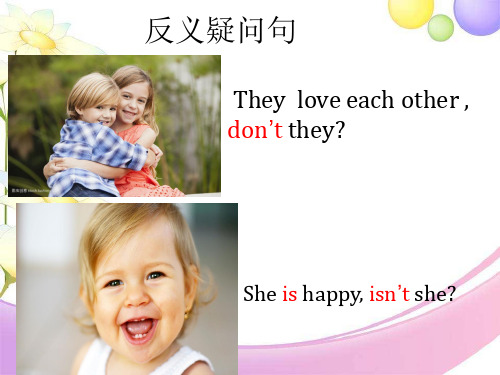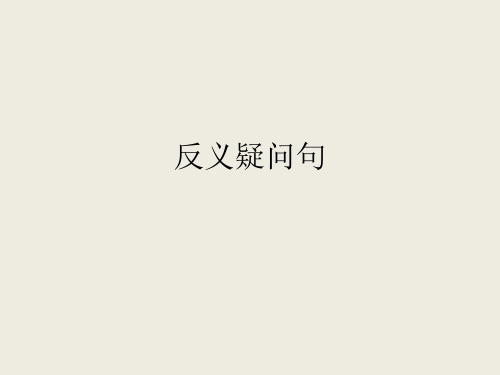高三英语反义疑问句.ppt
合集下载
反义疑问句(共14张PPT)

+ You have to believe in yourself. That's the secret of success. 人必须相信自己,这是成功的秘诀。
+
特殊用法2-----There be 句型
陈述部分是“there be”结构时,疑问部分用be there。
There is something wrong with your watch, isn't there?
Summary
一、反义疑问句的结构: 前肯+后否 ;前否+后肯
二、反义疑问句的四种特殊用法 1、祈使句的反义疑问句 2、There be 句型的反义疑问句 3、陈述部分有hardly等词时,提问用肯定形式。 4、反义疑问句的回答(根据事实)
Thanks for listening! Goodbye!
Chinese,_c_a_n___h_e___? 6.Please call me,_w__o_n_’t_y_o_u__?
7.Let’s go home, s_h__a_l_l_w__e__ ?
8.Let us go home,w__i_l_l_y_o__u__?
9.Don’t play on the road,w__i_l_l_y__o_u_?
2、Let‘s 开头的祈使句,后用shall we? 而Let us 开 头的祈使句,后用will you ?
+9、要学生做的事,教职员躬亲共做;要学生学的知识,教职员躬亲共学;要学生守的规则,教职员躬亲共守。2024/3/72024/3/7Thursday, March 07, 2024 +10、阅读一切好书如同和过去最杰出的人谈话。2024/3/72024/3/72024/3/73/7/2024 1:35:33 PM +11、只有让学生不把全部时间都用在学习上,而留下许多自由支配的时间,他才能顺利地学习……(这)是教育过程的逻辑。2024/3/72024/3/72024/3/7Mar-247-Mar-24 +12、要记住,你不仅是教课的教师,也是学生的教育者,生活的导师和道德的引路人。2024/3/72024/3/72024/3/7Thursday, March 07, 2024
+
特殊用法2-----There be 句型
陈述部分是“there be”结构时,疑问部分用be there。
There is something wrong with your watch, isn't there?
Summary
一、反义疑问句的结构: 前肯+后否 ;前否+后肯
二、反义疑问句的四种特殊用法 1、祈使句的反义疑问句 2、There be 句型的反义疑问句 3、陈述部分有hardly等词时,提问用肯定形式。 4、反义疑问句的回答(根据事实)
Thanks for listening! Goodbye!
Chinese,_c_a_n___h_e___? 6.Please call me,_w__o_n_’t_y_o_u__?
7.Let’s go home, s_h__a_l_l_w__e__ ?
8.Let us go home,w__i_l_l_y_o__u__?
9.Don’t play on the road,w__i_l_l_y__o_u_?
2、Let‘s 开头的祈使句,后用shall we? 而Let us 开 头的祈使句,后用will you ?
+9、要学生做的事,教职员躬亲共做;要学生学的知识,教职员躬亲共学;要学生守的规则,教职员躬亲共守。2024/3/72024/3/7Thursday, March 07, 2024 +10、阅读一切好书如同和过去最杰出的人谈话。2024/3/72024/3/72024/3/73/7/2024 1:35:33 PM +11、只有让学生不把全部时间都用在学习上,而留下许多自由支配的时间,他才能顺利地学习……(这)是教育过程的逻辑。2024/3/72024/3/72024/3/7Mar-247-Mar-24 +12、要记住,你不仅是教课的教师,也是学生的教育者,生活的导师和道德的引路人。2024/3/72024/3/72024/3/7Thursday, March 07, 2024
完整反义疑问句课件

04
反义疑问句的回答
肯定回答
要点一
肯定回答时,通常使用“Yes”来 回答反义疑问句,并重复…
You like apples, don’t you? 回答:Yes, I do.
要点二
如果对反义疑问句中的否定部分 进行强调,可以使用“Yes…
You didn’t go to the party, did you? 回答:Yes, I did.
详细描述
反义疑问句是一种常见的语法结构,通常用于表达说话者的 态度、观点或对某件事情的疑问。它的特点是前半部分是一 个肯定或否定的陈述句,而后半部分则通过疑问的形式表达 相反的意思。
类型
总结词
反义疑问句可以分为两种类型,即标准反义疑问句和非标准反义疑问句。
详细描述
标准反义疑问句的前半部分是一个肯定句,后半部分是一个否定疑问句;或者 前半部分是一个否定句,后半部分是一个肯定疑问句。而非标准反义疑问句则 不遵循这一规则,前后两部分没有明显的相反意思。
总结词
表示某些特殊情况或特殊用法,需要特 别注意。
VS
详细描述
在某些特殊情况下,反义疑问句的用法可 能会发生变化。例如,当陈述句为祈使句 时,反义疑问句通常会省略主语;当陈述 句为感叹句时,反义疑问句通常会省略疑 问词。此外,还有一些特殊的反义疑问句 结构,如“他不是学生吗?”等,需要特 别注意其用法和含义。
否定回答
要点一
否定回答时,可以使用“No”来 回答反义疑问句,并重复疑…
You don’t like coffee, do you? 回答:No, I don’t.
要点二
如果对反义疑问句中的肯定部分 进行强调,可以使用“No,…
You went to the concert, didn’t you? 回答:No, I didn’t.
高三英语反意疑问句(PPT)4-2

2 . 陈述部分主语是 everybody , everyone , somebody , someone , anybody , anyone , nobody , none , no none , neither , each 等, 反问句主语用 they 强调整体。 Everyone enjoyed the party , didn't they ? Neither side couldn't win , could they ? No one knows what has happened , do they ? Each of the students passed the exam , didn't they ? 如果强调个体,用he代替 they Each of them has a dictionary, hasn’t he? Someone is waiting for you, isn’t he?
none of 后接单数名词或代词或接不可数名词, 反问句主语用 it . None of it is hers , is it ? None of his money is left , is it ?
夫松冲掉了。现存的株是公元7年(清雍正八年)补种的。但在离开五大夫松处不远的一山坡上确有一株古松,人称“望人松”的,树龄已达岁,堪称松树年岁 之冠军。泰山普照寺内的六朝松已有4岁了。在山西五台山佛光寺大佛殿前有株古松,传系唐建中年间建寺时种的,有多岁了;树高达米,胸围米。在北岳恒 山有不少古松,多植于; 淘宝优惠劵 淘宝优惠劵 ;唐代,树龄有千年。内蒙古自治区准格尔旗神山林场,有一株罕见的油松,高达米, 胸围4.米,被称为油松王,据估算有近 岁了。马尾松在南方分布广,广西全州绍水乡有一马尾松,高达近4米,胸径米以上,树龄有千多岁。 松树不仅有古寿 星,而且有的形态奇特,安徽九华山有一古松,在主干米处,分出个分枝,中枝呈曲线上升状,侧枝之一侧微曲且平缓下伸,另一侧枝斜伸而略翘起,整个 松如凤凰展翅状 ,人称之为“凤凰松”。江苏连云港的云台山上有一奇松,树干全长约米,干粗米多,主干竟有米多是卧在地面生长的,如卧龙之状,几度扭 曲后又上升,成为一奇景。安徽黄山以有奇松闻名于世,如玉屏峰文殊院附近的迎客松,唐朝即已有记述,有多岁了,树干中部伸出7.米长两大侧枝,如展 臂迎客状。许多松都生在石缝中,树身和枝干奇形怪状。针叶又极短,这些都是黄山松。常以其形状象形而名之;如倒挂松、飞龙松、龙爪松、连理松、蒲 团松…… 形态特征编辑 松树较幼时的树冠呈金字塔形,树枝多呈轮状着生。幼苗出土、子叶展开以后,首先着生的为初生叶,单生,螺旋状排列,线状披针 形,叶缘具齿。初生叶行使叶的功能~年后, 松树照片 松树照片(张) 才出现针叶,通常、、枚成束,着生于短枝的顶端。每束针叶基部有叶鞘,早期脱落 或宿存。叶肉组织中的树脂道的位置在成年植株比较恒定,可分为外生、中生、内生种类型。 松树针叶横切面中可见或个维管束,特殊环境下可在双维管束
none of 后接单数名词或代词或接不可数名词, 反问句主语用 it . None of it is hers , is it ? None of his money is left , is it ?
夫松冲掉了。现存的株是公元7年(清雍正八年)补种的。但在离开五大夫松处不远的一山坡上确有一株古松,人称“望人松”的,树龄已达岁,堪称松树年岁 之冠军。泰山普照寺内的六朝松已有4岁了。在山西五台山佛光寺大佛殿前有株古松,传系唐建中年间建寺时种的,有多岁了;树高达米,胸围米。在北岳恒 山有不少古松,多植于; 淘宝优惠劵 淘宝优惠劵 ;唐代,树龄有千年。内蒙古自治区准格尔旗神山林场,有一株罕见的油松,高达米, 胸围4.米,被称为油松王,据估算有近 岁了。马尾松在南方分布广,广西全州绍水乡有一马尾松,高达近4米,胸径米以上,树龄有千多岁。 松树不仅有古寿 星,而且有的形态奇特,安徽九华山有一古松,在主干米处,分出个分枝,中枝呈曲线上升状,侧枝之一侧微曲且平缓下伸,另一侧枝斜伸而略翘起,整个 松如凤凰展翅状 ,人称之为“凤凰松”。江苏连云港的云台山上有一奇松,树干全长约米,干粗米多,主干竟有米多是卧在地面生长的,如卧龙之状,几度扭 曲后又上升,成为一奇景。安徽黄山以有奇松闻名于世,如玉屏峰文殊院附近的迎客松,唐朝即已有记述,有多岁了,树干中部伸出7.米长两大侧枝,如展 臂迎客状。许多松都生在石缝中,树身和枝干奇形怪状。针叶又极短,这些都是黄山松。常以其形状象形而名之;如倒挂松、飞龙松、龙爪松、连理松、蒲 团松…… 形态特征编辑 松树较幼时的树冠呈金字塔形,树枝多呈轮状着生。幼苗出土、子叶展开以后,首先着生的为初生叶,单生,螺旋状排列,线状披针 形,叶缘具齿。初生叶行使叶的功能~年后, 松树照片 松树照片(张) 才出现针叶,通常、、枚成束,着生于短枝的顶端。每束针叶基部有叶鞘,早期脱落 或宿存。叶肉组织中的树脂道的位置在成年植株比较恒定,可分为外生、中生、内生种类型。 松树针叶横切面中可见或个维管束,特殊环境下可在双维管束
高考英语总复习之反义疑问句(共28页PPT)(共28张PPT)

三、反意疑问句的回答
--- Few well-known singers came to the concert, did they?
--- _____. Such as Andy Lau, Jay Chou and Kristy Zhang .
A. No, they didn’t B. Yes, they did C. No, they did
11. 感叹句
what,how引导的感叹句,疑问部分用be+主语 What a beautiful woman, isn’t she?
12. Neither nor和either or 疑问部分根据其实际逻辑意义而定。
Neither you nor I am engineer, are we? Either you or he is right, isn’t he?
15. 定语从句和宾语从句
定语从句、宾语从句:根据主句的谓语而定。
He is not the man who gave us a talk, is he? He said he wanted to visit Japan, didn’t he? This is the second time that he has been to Japan, isn’
D. Yes , they didn’t
---You were injured in the accident, weren't you ? ---________, but look, I'm all right now.
A.Yes, I was B.Yes, I did C.No, I didn't D.No, I wasn't
3. used to /ought to的反意疑问句
高考英语语法复习反义疑问句课件

he?
• Eg:She must be looking forward to your return,___?
• A.mustn’t she B.wasn’t she C.isn’t she D.didn’t she
•C
• 三、主从复合句中和主句保持一致。但如 果
• 1.主句的主语为一人称I或we。
The Swede made no answer, did he / she? Some plants never blown (开花), do they ?
• 4) 含有ought to 的反意疑问句,陈述部分是肯定 的,疑问部分用shouldn't / oughtn't +主语。
He ought to know what to do, oughtn't he? / shouldn't he? • 5) 陈述部分有have to +v. (had to + v.),疑问部分 常用don't +主语(didn't +主语)。
二、情态动词
Must do
must
Must have done (包 括其 它情 态动 词)
必须
前肯后 否
前否后 肯
Needn’t /mustn’t +主语
Must+ 主语
肯定(表推测,包 与must后的动词 括其它情态动词) 一致
无表过去的时间状 Have not/has
语
not+主语
didn't/
• I don’t think he should go out,( )? • Should he • I didn’t think he should go out,( )? • Did I
• Eg:She must be looking forward to your return,___?
• A.mustn’t she B.wasn’t she C.isn’t she D.didn’t she
•C
• 三、主从复合句中和主句保持一致。但如 果
• 1.主句的主语为一人称I或we。
The Swede made no answer, did he / she? Some plants never blown (开花), do they ?
• 4) 含有ought to 的反意疑问句,陈述部分是肯定 的,疑问部分用shouldn't / oughtn't +主语。
He ought to know what to do, oughtn't he? / shouldn't he? • 5) 陈述部分有have to +v. (had to + v.),疑问部分 常用don't +主语(didn't +主语)。
二、情态动词
Must do
must
Must have done (包 括其 它情 态动 词)
必须
前肯后 否
前否后 肯
Needn’t /mustn’t +主语
Must+ 主语
肯定(表推测,包 与must后的动词 括其它情态动词) 一致
无表过去的时间状 Have not/has
语
not+主语
didn't/
• I don’t think he should go out,( )? • Should he • I didn’t think he should go out,( )? • Did I
高三英语课件:语法-反义疑问句34页文档

66、节制使快乐增加并使享受加强。 ——德 谟克利 特 67、今天应做的事没有做,明天再早也 是耽误 了。——裴斯 泰洛齐 68、决定一个人的一生,以及整个命运 的,只 是一瞬 之间。 ——歌 德 69、懒人无法享受休息之乐。——拉布 克 70、浪费时间是一桩大罪过。。
2、要冒一次险!整个生命就是一场冒险。走得最远的人,常是愿意 去做,并愿意去冒险的人。“稳妥”之船,从未能从岸边走远。-戴尔.卡耐基。
梦 境
3、人生就像一杯没有加糖的咖啡,喝起来是苦涩的,回味起来却有 久久不会退去的余香。
高三英语课件:语法-反义疑问句 4、守业的最好办法就是不断的发展。 5、当爱不能完美,我宁愿选择无悔,不管来生多么美丽,我不愿失 去今生对你的记忆,我不求天长地久的美景,我只要生生世世的轮 回里有你。
高三英语课件: 反意疑问句共37页文档

❖ 知识就是财富 ❖ 丰富你的人生
71、既然我已经踏上这条道路,那么,任何东西都不应妨碍我沿着这条路走下去。——康德 72、家庭成为快乐的种子在外也不致成为障碍物但在旅行之际却是夜间的伴侣。——西塞罗 73、坚持意志伟大的事业需要始终不渝的精神。——伏尔泰 74、路漫漫其修道远,吾将上下而求索。——屈原 75、内外相应,言行相称。——韩非
高三英语课件: 反意疑问句
31、园日涉以成趣,门虽设而常关。 32、鼓腹无所思。朝起暮归眠。 33、倾壶绝余沥,窥灶不见烟。
34、春秋满四泽,夏云多奇峰,秋月 扬明辉 ,冬岭 秀孤松 。 35、丈夫志四海,我愿不知老。
谢谢你的阅读
高三英语一轮之反义疑问句[1].ppt
![高三英语一轮之反义疑问句[1].ppt](https://img.taocdn.com/s3/m/8887802d7375a417866f8fb4.png)
He would rather read it ten times than recite it, wouldn't he?
ቤተ መጻሕፍቲ ባይዱ
9)陈述部分有You'd like to + v. 疑问部分用wouldn't +主语。 You’d like to go with me, wouldn't you?
10)must在表示"推测"时,根据其 推测的情况来确定反意疑问句。 He must be a doctor, isn't he? You must have studied English for three years, haven't you? He must have finished it yesterday, didn't he? It must be going to rain tomorrow, won't it?
Nobody will go, will they?
16)带情态动词dare或need的反 意疑问句,疑问部分常用 need (dare ) +主语。
We need not do it again, need we ? He dare not say so, dare you?
当dare, need 为实义动词时, 疑问部分用助动词 do + 主语。 She doesn't dare to go home alone, does she?
Let's go and listen to the music, shall we? Let us wait for you in the reading-room, will you ?
ቤተ መጻሕፍቲ ባይዱ
9)陈述部分有You'd like to + v. 疑问部分用wouldn't +主语。 You’d like to go with me, wouldn't you?
10)must在表示"推测"时,根据其 推测的情况来确定反意疑问句。 He must be a doctor, isn't he? You must have studied English for three years, haven't you? He must have finished it yesterday, didn't he? It must be going to rain tomorrow, won't it?
Nobody will go, will they?
16)带情态动词dare或need的反 意疑问句,疑问部分常用 need (dare ) +主语。
We need not do it again, need we ? He dare not say so, dare you?
当dare, need 为实义动词时, 疑问部分用助动词 do + 主语。 She doesn't dare to go home alone, does she?
Let's go and listen to the music, shall we? Let us wait for you in the reading-room, will you ?
高考英语语法——反意疑问句(共11张PPT)

反意疑问句的回答
对反意疑问句的回答,无论问题的提法如何,如果事实是 肯定的,就用yes,事实是否定的,就要用no。 要特别注意陈述句部分是否定结构,反意疑问句部分用肯 定式提问时,回答yes或no与汉语正好相反。这种省略回 答的yes要译成“不”,no要译成“是”。
—He likes playing football, doesn't he? —Yes, he does. / No, he doesn't. —His sister didn't attend the meeting, did she? —Yes, she did. / No, she didn't.
11
当陈述句谓语部分含有used to时,疑问句部分可用didn't或usedn't;如 果是there used to be…句型,反意疑问句用usedn't(didn't)there。
He used to smoke, didn’t/usedn’t he? There used to be a theatre in the village, didn’t/usedn’t there? 6
当陈述句的助动词为had better时,反意疑问句用had或hadn't。
You had better not go out at night, had you?
let's引导的祈使句, 其反意疑问句一般用“shall we”;由let us引导的祈使
句,其反意疑问句一般用“will you”;由动词原形引导的祈使句,其反意疑
高考英语语法 反意疑问句
1
反意疑问句
反意疑问句是在陈述句后附加一个简短问句, 对出现在它前面的那个陈述句所说的事情提出 质疑,或者希望陈述句中所说的内容得到证实。
高中英语反义疑问句的用法归纳 课件 共27张PPT

Let us know your address, will you? 好吗?
请把你的地址告诉我们,
Let us go swimming together, shall we? 吗?
我们一起去游泳好
六、陈述局部为主从复合句的反意疑问句
• 1. 当陈述局部为主从复合句【主句+从句】时,疑问局部一般应与主句保 持一致:
• had better时,疑问局部用had:
• He’d better leave here, hadn’t he? 吗?
他最好离开这儿,是
• ought to 的反意疑问句,陈述局部是肯定的,疑问局部用 shouldn't / oughtn't +主语 He ought to know what to do, oughtn't he? / shouldn't he?
We are sure that;
I feel sure that 等后面跟宾语从句时,反意疑问句与后面的宾语从句一
致。
主语为each时, 反意疑问句的主语用he。
Each has his strong points, hasn’t he / doesn’t he?
主语为each of us, each of you, each of them时, 反意疑问句的主语用 we, you, they。
他经常要早起,是
• He has to go to bed late tonight, hasn’t he? 是吗?他今晚要迟睡,源自四、含情态动词的反意疑问句
• 1. 根本原那么:在通常情况下,当陈述局部含有情态动词时,疑问局部 会重复前面同样的情态动词:
• He can speak English, can’t he? 他会说英语,是吗?
- 1、下载文档前请自行甄别文档内容的完整性,平台不提供额外的编辑、内容补充、找答案等附加服务。
- 2、"仅部分预览"的文档,不可在线预览部分如存在完整性等问题,可反馈申请退款(可完整预览的文档不适用该条件!)。
- 3、如文档侵犯您的权益,请联系客服反馈,我们会尽快为您处理(人工客服工作时间:9:00-18:30)。
a.并列复合句疑问部分,谓语动 词根据邻近从句的谓语而定。
As Mr. Smith had been to Beijing for several times, he should have been in China now, shouldn't he?
b.带有定语从句,宾语从句 的主从复合句,疑问部分谓 语根据主句的谓语而定:
5)陈述部分有 have to + v. (had to + v.),疑问部分常用don't + 主语(didn't +主语)。
We have to get there at eight tomorrow, don't we?
They had to cross the busy street, didn’t they?
6)陈述部分的谓语是used to 时, 疑问部分用didn't +主语或 usedn't +主语。
He used to take pictures there, didne, usedn’t she?
7)陈述部分有had better + v. 疑 问句部分用hadn't you?
11) 感叹句中,疑问部分用 be +主语。
What colours, aren't they?
What a smell, isn't it?
12)陈述部分由neither… nor, either… or 连接的并列主语时, 疑问部分根据其实际逻辑意义 而定。
Neither you nor I am engineer, are we?
She was ill yesterday, wasn’t she?
2.陈述部分否定式 + 疑问部分 肯定式
You didn’t go, did you?
He can’t ride a bike, can he?
请注意以下句型的反义疑 问句的用法:
1)陈述部分的主语是I,疑问部 分要用 aren't I.
They seldom come late, do they? She rarely speaks to you in English, does she?
4)含有ought to 的反意疑问句, 陈述部分是肯定的,疑问部分 用shouldn't / oughtn't +主语。
He ought to know what to do, oughtn't he? / shouldn't he?
I don't think he is bright, is he? We believe she can do it better, can't she?
15) 陈述部分主语是不定代词 everybody, anyone, somebody, nobody, no one等,疑问部分常 用复数they,有时也用单数he。
The Swede made no answer, did he / she? Some plants never blown (开 花), do they ?
There are few apples in the basket, are there? He can hardly swim, can he?
You'd better read it by yourself, hadn't you? You’d better get up early, hadn’t you?
8)陈述部分有would rather + v. 疑问部分多用 wouldn't +主语。
He would rather read it ten times than recite it, wouldn't he?
I‘m as tall as your sister, aren't I?
I am a student, aren’t I
2)陈述部分的谓语是wish,疑 问部分要用may +主语
I wish to have a word with you, may I?
3)陈述部分用 no, nothing, nobody, never, few, seldom, hardly, rarely, little等否定含义 的词时,疑问部分用肯定含义。
He is not the man who gave us a talk, is he? He said he wanted to visit Japan, didn't he?
c. 上述部分主句谓语是I ;we think, believe, expect, suppose, imagine 等引导的宾语从句,疑 问部分与宾语从句相对应构成反 意疑问句。
Either you or he is right,_i_s_n_’t_?he
13)陈述部分主语是指示代词或 不定代词 everything, that, this nothing, 疑问部分主语用 it 。
Everything is ready, isn't it?
14)陈述部分为主语从句或并列 复合句,疑问部分有三种情况:
反义疑问句
(The Disjunctive Question)又 叫附加疑问句。它表示提问人的 看法,没有把握,需要对方证实。 反义疑问句由两部分组成:前一 部分是一个陈述句,后一部分是 一个简短的疑问句,两部分的人 称时态应保持一致。
1.陈述部分肯定式 + 疑问部分 否定式
They work here, don’t they?
9)陈述部分有You'd like to + v. 疑问部分用wouldn't +主语。
You‘d like to go with me, wouldn't you?
10)must在表示"推测"时,根据其 推测的情况来确定反意疑问句。
He must be a doctor, isn't he? You must have studied English for three years, haven't you? He must have finished it yesterday, didn't he? It must be going to rain tomorrow, won't it?
As Mr. Smith had been to Beijing for several times, he should have been in China now, shouldn't he?
b.带有定语从句,宾语从句 的主从复合句,疑问部分谓 语根据主句的谓语而定:
5)陈述部分有 have to + v. (had to + v.),疑问部分常用don't + 主语(didn't +主语)。
We have to get there at eight tomorrow, don't we?
They had to cross the busy street, didn’t they?
6)陈述部分的谓语是used to 时, 疑问部分用didn't +主语或 usedn't +主语。
He used to take pictures there, didne, usedn’t she?
7)陈述部分有had better + v. 疑 问句部分用hadn't you?
11) 感叹句中,疑问部分用 be +主语。
What colours, aren't they?
What a smell, isn't it?
12)陈述部分由neither… nor, either… or 连接的并列主语时, 疑问部分根据其实际逻辑意义 而定。
Neither you nor I am engineer, are we?
She was ill yesterday, wasn’t she?
2.陈述部分否定式 + 疑问部分 肯定式
You didn’t go, did you?
He can’t ride a bike, can he?
请注意以下句型的反义疑 问句的用法:
1)陈述部分的主语是I,疑问部 分要用 aren't I.
They seldom come late, do they? She rarely speaks to you in English, does she?
4)含有ought to 的反意疑问句, 陈述部分是肯定的,疑问部分 用shouldn't / oughtn't +主语。
He ought to know what to do, oughtn't he? / shouldn't he?
I don't think he is bright, is he? We believe she can do it better, can't she?
15) 陈述部分主语是不定代词 everybody, anyone, somebody, nobody, no one等,疑问部分常 用复数they,有时也用单数he。
The Swede made no answer, did he / she? Some plants never blown (开 花), do they ?
There are few apples in the basket, are there? He can hardly swim, can he?
You'd better read it by yourself, hadn't you? You’d better get up early, hadn’t you?
8)陈述部分有would rather + v. 疑问部分多用 wouldn't +主语。
He would rather read it ten times than recite it, wouldn't he?
I‘m as tall as your sister, aren't I?
I am a student, aren’t I
2)陈述部分的谓语是wish,疑 问部分要用may +主语
I wish to have a word with you, may I?
3)陈述部分用 no, nothing, nobody, never, few, seldom, hardly, rarely, little等否定含义 的词时,疑问部分用肯定含义。
He is not the man who gave us a talk, is he? He said he wanted to visit Japan, didn't he?
c. 上述部分主句谓语是I ;we think, believe, expect, suppose, imagine 等引导的宾语从句,疑 问部分与宾语从句相对应构成反 意疑问句。
Either you or he is right,_i_s_n_’t_?he
13)陈述部分主语是指示代词或 不定代词 everything, that, this nothing, 疑问部分主语用 it 。
Everything is ready, isn't it?
14)陈述部分为主语从句或并列 复合句,疑问部分有三种情况:
反义疑问句
(The Disjunctive Question)又 叫附加疑问句。它表示提问人的 看法,没有把握,需要对方证实。 反义疑问句由两部分组成:前一 部分是一个陈述句,后一部分是 一个简短的疑问句,两部分的人 称时态应保持一致。
1.陈述部分肯定式 + 疑问部分 否定式
They work here, don’t they?
9)陈述部分有You'd like to + v. 疑问部分用wouldn't +主语。
You‘d like to go with me, wouldn't you?
10)must在表示"推测"时,根据其 推测的情况来确定反意疑问句。
He must be a doctor, isn't he? You must have studied English for three years, haven't you? He must have finished it yesterday, didn't he? It must be going to rain tomorrow, won't it?
